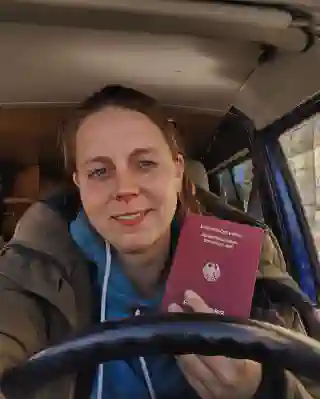
Passport application abroad - how, where, what?
Your passport is expiring, and you're traveling? That's exactly what happened to me. In this post, I'll explain what you need to consider when you have to apply for a passport abroad

The German passport is one of the most valuable passports in the world, alongside France, Italy, Spain, Japan, and Singapore, as shown by the Passport Index, a global ranking of the travel freedom of states and territories. With the ability to visit 194 countries visa-free, this is a privilege granted solely by being born in the “right country.” But what happens when the passport expires and you are not in Germany?
That’s exactly what happened to me, and now I want to tell you how to get a new passport.
Getting a New Passport in Germany - the Easy Way
In Germany, it’s relatively straightforward. You schedule an appointment for passport application, where the first passport (for those under 24) is valid for 6 years and costs €37.50, while subsequent passports (for those 24 and older) are valid for 10 years and cost €70. You’ll also need a biometric passport photo.
One point that personally bothers me is the requirement to pay for a document that is necessary due to identification requirements.
More information can be found here: https://www.bmi.bund.de/SharedDocs/faqs/DE/themen/moderne-verwaltung/reisepass/beantragung-kosten-abholung/02-gebuehren.html
It would be sensible for most people to check the expiration date of their passport and apply for a new one in a timely manner.
Getting a New Passport Abroad - the Costly Way
Of course, I could have been wise and applied for a new passport in Germany in time. However, the problem was that we hadn’t planned on still traveling after 2 1/2 years. The year came that was also marked as the expiration date on my passport.
But don’t panic, it’s also possible to apply for a new passport abroad. However, a trip to the consulate cannot be avoided.
Step 1: Where?
Unfortunately, you can’t apply for a passport online. First, you need to find out where the nearest German consulate or embassy is. In Canada, the German consulate is in Toronto. There are also consular agencies in many major cities. Mine was in Winnipeg. Here, I had to schedule an appointment via email and appear with all the required documents.
-

Quest’s parking lot in front of the consulate in Winnipeg.
Step 2: The Documents
The required documents can vary depending on the country. In Canada, I needed biometric photos taken according to German standards. The consulate staff recommended taking photos according to Canadian standards, as they could be cut to size at the consulate. Be sure to check if you’re taking biometric photos abroad.
In addition to the old passport, you’ll need money, a birth certificate (certified copy), and an envelope for the new passport. The passport will be sent by mail unless the consulate informs otherwise.
I didn’t have a certified birth certificate with me, but I applied for a copy online from my registry office and had it sent to me. That took 14 days, and I had my certified copy in hand. Very convenient. By the way, that cost €12.
-

The last picture of me and my passport before heading to the consulate’s satellite office in Winnipeg.
The Consulate/Embassy
Communication on-site can be in German or English. At the consulate in Ireland, only English was spoken, but here in Canada, the staff spoke German. The documents were submitted, fingerprints taken, and the fees paid in advance in cash. By the way, I also had to hand over my passport!!! Naturally, that felt really strange too.
You’ve Got Mail
A few weeks later, I received the new passport by mail, and my old passport was invalidated.
What About My US Visa?
I don’t have details about that yet, but the B2 visa in my old passport should not be tied to the passport. Information about this will follow.
In that spirit, best regards to all of you out there! Yours, Jo